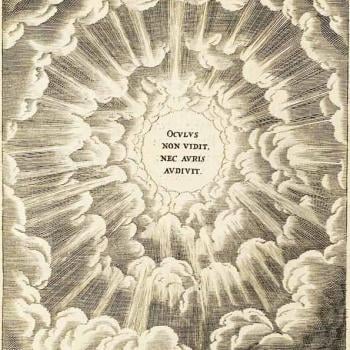 Dionysius in the Mystical Theology embraced and encouraged the use of both kataphatic and apophatic theology. All doctrinal theological discourse, all that is stated for the sake of others, will have some kataphatic element to it, using a variety of analogies and symbols to discuss God, even if later there is to be an apophatic denial of those same elements.
Dionysius in the Mystical Theology embraced and encouraged the use of both kataphatic and apophatic theology. All doctrinal theological discourse, all that is stated for the sake of others, will have some kataphatic element to it, using a variety of analogies and symbols to discuss God, even if later there is to be an apophatic denial of those same elements.
There are many, indeed, an infinite variety of ways kataphatic discourses about God can be had, with each way complementing every other kind, expressing truths which no other way can do just as well. When they are re brought together and examined alongside each other, the complementary features begin to serve as a kind of triangulation, helping us to understand better the direction we should take ourselves in order to apprehend the truth of God. When taken together, through the paradoxes which become apparent, we are able to realize the failure of any and all forms of kataphatic theology to comprehend the transcendental nature of God. What we have is true, insofar as it represents and points to the truth, but can quickly become an idol which keeps us away from God if we confuse what we attain as the absolute truth as it is in itself.
Kataphatic theology is best understood as establishing conventions which allow us to discuss God while not hold God bound to the conventions themselves. The better the conventions, the better God is represented. Nonetheless, all conventional formulations concerning God have one thing in common: they are trying to establish a means by which we can discuss the infinite, transcendent God in finite formulation. In that sense, they all equally fail, as the infinite infinitely transcends any and all finite representations. And yet, just as a hundred is greater than one, even if both of them when divided by infinity become equally nothing, there can be and are gradations of conventions, where some are greater, or “higher,” in that they take in account more abstractions or denials of what God is not into the equation, while some are said to be “lower” and more immanent or materialistic in form engaging a variety of lesser, less refined symbols to represent God. Such conventions, then, are to be understood as kinds of approximations being used to describe the absolute of God, with the higher or greater forms approximating the transcendent truth better than lesser symbols or conventions to explain God.
The more we engage the truth of God, and so deny or abstract away what is not true of God from our conventions, the better our approximations will become. Likewise, the better they are, the more like God they will be, and so the less we will have to say in order to establish that truth, until, at last, we come to engage the truth of God without words. Then, slowly, we will continue until we silence any and all thoughts in our head, all discursive reasoning or intuitive engagement with the truth, until we come to God in perfect silence. This silence allows God to reveal himself to us without any interference from ourselves. We set aside all we think we know about him so it can be said that we come to him in ignorance so that we can come know beyond all thoughts and words the truth of God. Then, having engaged God, having embraced the through union with God, we can once again descend from our heights into thoughts and words, discussing with others through such conventional means what we have gained from our experience with God. Knowing that we cannot put it all into words, knowing that we cannot confine the absolute in conventions, we do not try to do so; instead we establish approximations which help others learn about God where they are at until they are ready to follows us in the higher way knowing through transcendental union with God.
Mystical theology looks for and embraces the best conventional forms of representing the absolute truth of God while also recognizing and understanding how and why other forms of conventional truth are necessary. We must be able to skillfully employ words to help lead others to the truth beyond words; we must be able to use what God has given us in his grace as the means by which we can correct and redirect those who misunderstand our words by over-literalization, even as we must also use what has been given us as the means by which those words are to be made. Proper mystical theology can only be done after some sort of enlightenment from God, while it is possible for others, who realize the truth being discussed in and through mystical theologians, to follow mystical theology in a derivative form and still contribute to the discussion.
Our experience, when verified, gives vitality to our theology. And yet we must realize, because of the transcendence of God, that whatever we experience and come to know, we still have not comprehend God and so we have an infinite distance from ourselves and the absolute truth as it is in itself. We will always have more to experience, and we are likely to find someone who has experienced more than us to whom we should humbly listen and try to discern what they have to offer us. We are called to help each other, to share with each other the revelation and experiences we receive from God. Therefore, we are not to let ourselves become stuck in a quietist retreat seeking for greater and greater revelation from God ignoring what we have received and how it can be used to help others.
Thus, Dionysius wrote on how we descend from above when we theologize, as we give discourses about God to others, adding and employing more and more words as necessary to help them understand what it is we have to offer, while we ascend in meditation to a silence, becoming wholly voiceless so that we can be open to and unite ourselves to the transcendent unutterable truth which is found in God:
In the other case, the discourse, in descending from the above to the lowest, is widened according to the descent, to a proportionate extent; but now, in ascending from below to that which is above, in proportion to the ascent, it is contracted, and after a complete ascent, it will become wholly voiceless, and will be wholly united to the unutterable.
This is why Dionysius, in his whole discourse of the Mystical Theology, wrote not only of the basic truths of the Christian faith, affirming that dogmatic theology represents the truth of God as God revealed them to us, but also on the means of going beyond a simplistic understanding of the faith to engaging the greater truths which are being represented by those dogmatic truths. He explained how we are to understand the words we use, accepting their positive value but also their limitations, so we do not get stuck in mere conventions and ignore the greater truth which is meant to be conveyed by them. This, then, has Dionysius affirm them in their intention and meaning but also deny them in relation to the fact that the transcendent truth cannot be contained by any conventions, thoughts or words. As God is beyond all thought and speech, we are directed to the truth in silence; the more we ascend and find ourselves abstracting all that is not the truth from our conventions, the greater the proportion of such truth is to be found in our words, the less our words will be or will need to be to share with others who are close to our relative position in relation to the truth itself. Sometimes, it can be only one words, or some wordless presentation of the truth, which will allow such a transmission of truth to be given out; but those who are not yet ready will need more, indeed, often much more through a variety of analogies to help steer them in the right direction.
We are, therefore, expected to do more than read and discuss the insights Dionysius has given us, treating his work as mere theory. It is something which is to be put into practice. Christian theological truths, being presupposed, and the sacramental life, which gives us the grace which we need, should open us up to a spiritual life where we engage God in prayer and in silence. We adore God in and with words, lifting him up in the joy which we have of what we understand of his glory, as lovers talking about their beloved; but we also want to be with God, to experience God, and to do that, we must still our mind, to silence all thoughts, to get beyond all conventions and let God be God with us. Thus, in the glosses on the Mystical Theology by Thomas Gallus, we read:
In the present treatise, on the other hand, mounting up from lower to higher, as we go up the [supply of words] is contracted and narrowed. But when we reach the ecstasy of the mind, at that point all discourse, whether of mouth or of mind, will fail, because of course the discourse of the mind does not speak of the God beyond discourse. It remains only for the mind to be united and whole and wholly to the ineffable and eternal Word. For since there is no intermediary between the mind and God, after the removal of all [attributes] from God is done there remains nothing but uniting beyond the mind. [1]
In our experience of God, we should not forget others. We are called to love God, but in our love of God, we are to love others as ourselves. We should not selfishly relish our quietude. Rather, we should let ourselves be embraced by the power of love which forms as a result of that union. Mysticism takes us out of ourselves, including out of our selfishness, into union God, and in that union, we are sent back into the world to share God, and all the graces we have obtained from our union with God, with others. We will then speak of God, directing others with our speech, revealing the best we can the truth which cannot be contained by words.
[Image=Mystical Marriage of St. Catherine by Barna da Siena. [Public domain], via Wikimedia Commons]
[1] Thomas Gallus “Exposicio” in Mystical Theology: The Glosses of Thomas Gallus and the Commentary of Robert Grosseteste on De Mystica Theologia. Trans. and ed. By James McEvoy (Parish: Peeters, 2003), 43.
Stay in touch! Like A Little Bit of Nothing on Facebook













